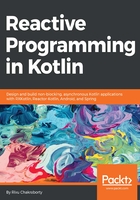
A Short Introduction to Reactive Programming
The term reactive got famous recently. Not only did it get trending, but it has started ruling the software development sector with new blog posts articles every day, and presentations, emerging frameworks and libraries, and more. Even the big IT companies that are often referred to as market giants, such as Google, Facebook, Amazon, Microsoft, and Netflix, are not only supporting and using reactive programming themselves, but they've even started releasing new frameworks for the same.
So, as a programmer, we are wondering about reactive programming. Why is everyone getting crazy about it? What does reactive programming exactly mean? What are the benefits of reactive programming? And, finally, should we learn it? If yes, then how?
On the other hand, Kotlin is also the newest programming language you've heard of (we're guessing you've heard of Kotlin, as this book assumes that you've a little understanding of the language). Kotlin, as a language, solves many important problems in Java. The best part is its interoperability with Java. If you carefully watch the trends, then you would know that Kotlin has created not a strong wind but a storm to blow things around it. Even the Google at Google IO/17 declared its official support for Kotlin as an official programming language for Android application development, noting that it is the first time since the perception of the Android Framework that Google has added another language to the Android family other than Java. Soon after, Spring also expressed their support for Kotlin.
To say it in simple words, Kotlin is powerful enough to create a great application, but if you combine reactive programming style with Kotlin, it would be super easy to build great apps better.
This book will present reactive programming in Kotlin with RxKotlin and Reactor, along with their implementations in Spring, Hibernate, and Android.
In this chapter, we will cover the following topics:
- What is reactive programming?
- Reasons to adapt functional reactive programming
- Reactive Manifesto
- Comparison between the observer (reactive) pattern and familiar patterns
- Getting started with RxKotlin